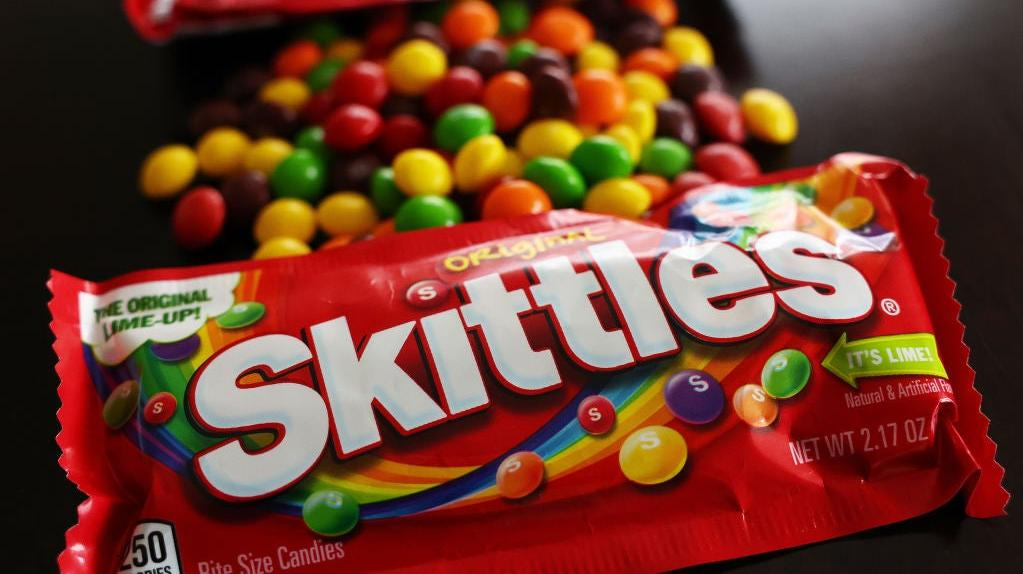No, California Is Not Banning Skittles
Red dye No. 3 and other additives have been banned in California, but misinformation persists.
After the California legislature passed a bill in mid-September to ban four potentially hazardous food additives, California governor Gavin Newsom officially signed it into law on October 7. It's known as the California Food Safety Act, first introduced in February this year—and it's caused a lot of confusion since then.
The additives that will be banned are red dye No. 3, potassium bromate, brominated vegetable oil, and propylparaben, which are commonly found in mass-manufactured food such as baked goods, candies, and beverages. Here's a quick explainer on what this means for the snack industry.
Why has California banned these food additives?
The food additives in question are already illegal throughout the European Union as well as other countries around the world. They've all been linked to health issues in various studies, and while correlation is not the same as causation, there is at least cause for concern.
Red dye No. 3, also known as erythrosine, is an artificial color derived from petroleum. It's been linked to cancer when given to lab animals in high quantities, which is why the FDA has already long banned its use in cosmetics. However, it's still allowed to be included in food and medicine coatings, in products like Hot Tamales and Skittles.
Potassium bromate is a flour additive that's used to improve the texture of bread dough as well as other commercial baked goods. It also has been linked to cancer in lab testing on rodents, though the Center for Research on Ingredient Safety at Michigan State University says that when products are properly baked, very little potassium bromate remains in the final product.
Brominated vegetable oil is an emulsifier used in citrus-flavored drinks to keep the flavoring from separating from the rest of the liquid. PepsiCo removed it from Gatorade in 2013, and in 2014, Coca-Cola and PepsiCo both removed the ingredient from most of their respective beverage lineups, though MTN DEW continued to include it until 2020. It's been connected to neurological issues when consumed in large quantities, as in two liters of soda or more per day.
Finally, propylparaben, an antimicrobial preservative in food and cosmetics, is believed to potentially act as an endocrine disruptor, as it mimics estrogen in the body.
California’s food additive ban will begin in 2027
Though the bill has passed in 2023, implementation of the ban will take place in 2027, which gives food manufacturers time to reformulate their recipes. Some people are taking the passage of the California Food Safety Act to mean that things like Skittles have been immediately banned altogether, but that's not really what's happening. It's an ingredient ban, not a product ban, which means that as long as the manufacturers remove the components in question, candies and other products will still be fine to sell in California.
Crime is through the roof, worst drug epidemic ever & homelessness at an all time high in CA... Let's focus on Skittles pic.twitter.com/ohWQcUcQjf
— Mario Lopez (@mariolopezviva) October 10, 2023
Actor Mario Lopez shared a screenshot on X (formerly Twitter) from the viral-news-based Instagram account @pubity that reads, "California becomes the first U.S. State to ban Skittles and 12,000 additional products for cancer-causing additives."
"Crime is through the roof, worst drug epidemic ever & homelessness at an all time high in CA... Let's focus on Skittles," Lopez posted sarcastically alongside the screenshot.
While it's inaccurate to say that these products are going away, it's reasonable to guess that the California ban might affect the products containing these ingredients on a nationwide scale. Starburst, for example, probably would not create an alternative recipe only for the California market, especially if any other state legislature is likely to follow in California's footsteps. Instead, the recipe would be altered for all of us. It might even include bugs.
